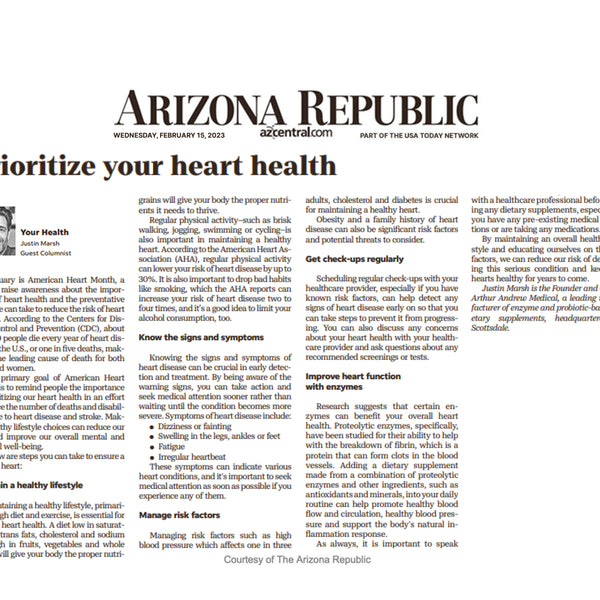
Prioritize Your Heart Health

February is American Heart Month, a time to raise awareness about the importance of heart health and the preventative steps we can take to reduce the risk of heart disease. According to the Centers for Disease Control and Prevention (CDC), about 697,000 people die every year of heart disease in the U.S., or one in five deaths, making it the leading cause of death for both men and women.
The primary goal of American Heart Month is to remind people the importance of prioritizing our heart health in an effort to reduce the number of deaths and disabilities due to heart disease and stroke. Making healthy lifestyle choices can reduce our risk and improve our overall mental and physical well-being.
Below are steps you can take to ensure a healthy heart:
Maintain a healthy lifestyle
Maintaining a healthy lifestyle, primarily through diet and exercise, is essential for optimal heart health. A diet low in saturated and trans fats, cholesterol and sodium and high in fruits, vegetables and whole grains will give your body the proper nutrients it needs to thrive.
Regular physical activity–such as brisk walking, jogging, swimming or cycling–is also important in maintaining a healthy heart. According to the American Heart Association (AHA), regular physical activity can lower your risk of heart disease by up to 30%. It is also important to drop bad habits like smoking, which the AHA reports can increase your risk of heart disease two to four times, and it’s a good idea to limit your alcohol consumption, too.
Know the signs and symptoms
Knowing the signs and symptoms of heart disease can be crucial in early detection and treatment. By being aware of the warning signs, you can take action and seek medical attention sooner rather than waiting until the condition becomes more severe. Symptoms of heart disease include:
- Dizziness or fainting
- Swelling in the legs, ankles or feet
- Fatigue
- Irregular heartbeat
These symptoms can indicate various heart conditions, and it's important to seek medical attention as soon as possible if you experience any of them.
Manage risk factors
Managing risk factors such as high blood pressure which affects one in three adults, cholesterol and diabetes is crucial for maintaining a healthy heart.
Obesity and a family history of heart disease can also be significant risk factors and potential threats to consider.
Get check-ups regularly
Scheduling regular check-ups with your healthcare provider, especially if you have known risk factors, can help detect any signs of heart disease early on so that you can take steps to prevent it from progressing. You can also discuss any concerns about your heart health with your healthcare provider and ask questions about any recommended screenings or tests.
Improve heart function with enzymes
Research suggests that certain enzymes can benefit your overall heart health. Proteolytic enzymes, specifically, have been studied for their ability to help with the breakdown of fibrin, which is a protein that can form clots in the blood vessels. Adding a dietary supplement made from a combination of proteolytic enzymes and other ingredients, such as antioxidants and minerals, into your daily routine can help promote healthy blood flow and circulation, healthy blood pressure and support the body's natural inflammation response.
As always, it is important to speak with a healthcare professional before taking any dietary supplements, especially if you have any pre-existing medical conditions or are taking any medications.
By maintaining an overall healthy lifestyle and educating ourselves on the risk factors, we can reduce our risk of developing this serious condition and keep our hearts healthy for years to come.
Bio: Justin Marsh is the Founder and CEO of Arthur Andrew Medical, a leading manufacturer of enzyme and probiotic-based dietary supplements, headquartered in Scottsdale.